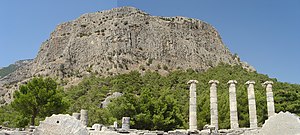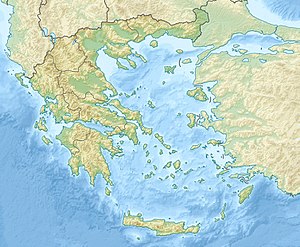Battle of Mycale
| Battle of Mycale | |||||||||
|---|---|---|---|---|---|---|---|---|---|
| Part of the Persian Wars | |||||||||
 Part of Mount Mycale, viewed from the ruins of Priene |
|||||||||
|
|||||||||
| Belligerents | |||||||||
| Greek city-states | Achaemenid Empire | ||||||||
| Commanders and leaders | |||||||||
|
Leotychides, Xanthippus Perilaus † |
Artaÿntes, Ithanitres Mardontes † Tigranes † |
||||||||
| Strength | |||||||||
| 40,000 men, 110-250 ships |
60,000 men, 300 ships |
||||||||
| Casualties and losses | |||||||||
| Considerable | Most of the army and all the ships | ||||||||
|
|
|||||||||
The Battle of Mycale (Ancient Greek: Μάχη τῆς Μυκάλης; Machē tēs Mykalēs) was one of the two major battles that ended the second Persian invasion of Greece during the Greco-Persian Wars. It took place on or about August 27, 479 BC on the slopes of Mount Mycale, on the coast of Ionia, opposite the island of Samos. The battle was fought between an alliance of the Greek city-states, including Sparta, Athens and Corinth, and the Persian Empire of Xerxes I.
The previous year, the Persian invasion force, led by Xerxes himself, had scored victories at the battles of Thermopylae and Artemisium, and conquered Thessaly, Boeotia and Attica; however, at the ensuing Battle of Salamis, the allied Greek navies had won an unlikely victory, and therefore prevented the conquest of the Peloponnese. Xerxes then retreated, leaving his general Mardonius with a substantial army to finish off the Greeks the following year.
In the summer of 479 BC, the Greeks assembled a huge army (by contemporary standards), and marched to confront Mardonius at the Battle of Plataea. At the same time, the allied fleet sailed to Samos, where the demoralised remnants of the Persian navy were based. The Persians, seeking to avoid a battle, beached their fleet below the slopes of Mycale, and, with the support of a Persian army group, built a palisaded camp. The Greek commander Leotychides decided to attack the Persians anyway, landing the fleet's complement of marines to do so.
...
Wikipedia

